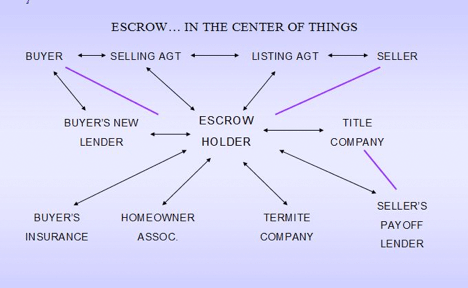Nationally, the word “Escrow” may be described as the type of account you set up with a Lender to impound your property taxes, insurance, and mortgage insurance payments.
In California and some of the other western states, this word describes the settlement process and the “Settlement Service” industry. The focus of this article is on the California Escrow Process – the Who, What and Why.
As a settlement process “going into Escrow” is the process of depositing money and documents with an impartial neutral third party who will hold them until all the mutually agreed upon conditions between the parties have been met.
There are many names that we give this “third party” – Escrow Holder, Settlement Agent, Stakeholder – why do we need them? The main reason is simple: the parties may not “trust” each other. How does a person know that he will get what he wants once he hands over his money? Unlike merchandise, a person can’t just walk into a store, hand his money over the counter and get back a Deed to a free and clear property.
Between parties there are always the following concerns:
- The lack of “trust” between parties.
- The need for a formal binding contract for all parties to perform
- The need for title insurance (real property transfer)
- The need to transfer some type of government license (alcohol license)
- The need for a clearing house to payoff liens, debts and vendors
- The need for a full accounting of funds and documents
Together with impartiality and neutrality, the Escrow Holder also adheres to the concept of confidentiality and the principle that we are not qualified and therefore will not impart any legal or financial advice. In today’s porous internet environment, the safe keeping of clients’ personal information is also of tantamount importance.
There are various types of transactions. Please be sure you contact the escrow company to make sure they can handle your particular type of escrow transaction.
- Sale of real estate property (Sale Escrow)
- Refinance or new loan on real estate property (Loan/Refinance Escrow)
- Sale of a business (Business Opportunity Escrow)
- Delivery of goods or other types of documents, etc. (Holding Escrow)
More detailed descriptions of the various types of transactions and how different each are, check out our vivaescrow.com site and go to this link.
Different types of escrows are governed under different types of laws and government regulations, some of which may change from year to year. It is imperative, for the clients’ benefit, that the Escrow Holder is up-to-date on all the laws and changes at all times.
If a simple diagram were to be drawn with respect to the connections between the parties in a settlement transaction, you will find the Escrow Holder carrying out instructions pursuant to the Contract between the Buyer and Seller, obtaining the documents and reports necessary, communicating with the Lender for loan documents, getting the funds from Buyer and Lender to close, paying the liens and Vendors and finally disbursing final net proceeds to the Seller. We are in the center of the settlement process.

Here is our cute, short animated video on “What is an Escrow?”, for your enjoyment.
I have described where “Escrow” stands in the scheme of the real estate transaction and what our contribution is, but do you really need to have an escrow transaction in order to transfer ownership of a property, a business or a vacant land? No, you can just sign a Deed or a Bill of Sale, give it to the Buyer, the Buyer gives you a check, and there you go, done! Unfortunately, in real life, things that can happen and do happen. Getting from A to B may mean a side trip to C and D first. It is not as easy as it seems. This then, is the focus of this part of the article.
Here is a list of other basic but important reasons why you need to go through escrow:
Document Preparation: The general public would not know which documents are needed for different scenarios and how each are completed properly. Incomplete or incorrectly prepared documents can have drastic unintended consequences. The following forms, for instance, are standard and used frequently in many transactions. It is rare that a consumer would actually know how to complete them.
- Grant Deed
- Quitclaim Deed
- Promissory Note
- Deed of Trust
- Affidavit of Death
- Power of Attorney
- Substitution of Trustee and Full Reconveyance
- Bill of Sale
For those who wish to try and complete the forms themselves, the standard forms are available on our website – VivaEscrow.com under the “Resources” tab.
Local Regulations: Different cities and counties have different government regulations. For instance:
Which cities require a residential property report before the property can be sold, or sewer inspections? If you would like to find go to vivaescrow.com and scroll down to “Popular Escrow Guides and Calculators”
Which cities require the payment of documentary transfer tax and how are they calculated? We have such a transfer tax calculator right in our website.
Federal Regulations: What about federal regulations? There seems to be a growing trend of the federal government seeking to impose their regulations on the local level.
Is the Seller a foreigner? The IRS has their complicated requirements under the FIRPTA laws if he is.
Is the transaction going to fall under the parameters of the FinCEN Geographical Targeting Orders? What is that and what are these parameters? More federal reporting forms have to be provided.
The new TRID 2015 regulations minutely details the timelines for processing, signing and funding a loan. You ask, “What is TRID?”
Here is our Video:
State Regulations. The State of California wants to be sure they get the amounts that are owed to them, whether in upfront income tax or sale and use tax, when the property is sold.
Does the Seller live on the property? If he does not, the Franchise Tax Board has requirements for upfront tax payment if he does not.
Are the sales taxes for a business sale calculated and paid? Are is the correct percentage, based on the city the business is in, being paid? You can find out at our “Resources” menu under “Industry Related Links”
Fraud! Fraud perpetuated by one of the parties or by a third party is a huge concern.
Are the parties in the transaction really who they say they are?
Is there evidence that not everything is as it seems? – please see our final video below.
Cloud on Title. Sometimes the ownership is not clear and the owner may not be able to convey title free of potential issues. The circumstances that lead to a “cloud on title” can be many and varied.
Has the owner transferred the property back and forth to others, making the ownership rather murky?
Is there a possibility that others may have an interest due to the transfers?
Did an owner pass away and the proper documents never been filed?
Was there an old document that was prepared incorrectly, thereby leading to questionable ownership?
Liens, Judgments and Debts, Oh My! From time to time the “cloud on title” shows up as outstanding unpaid liens. Liens and debts that are filed against a person’s individual name will attach to everything he owns. If these are not cleared before the property is transferred to the Buyer, then there is a possibility that the Buyer will end up having to pay it in the future.
Are there IRS or State Tax Liens against the owner that attached to the property?
Are there outstanding judgments that need to be paid?
Is there a loan that was paid off but a Release cannot be found?
What if there is a private loan? What documents are needed?
What if the Beneficiary of a private loan cannot be found?
What if there is a Mechanic’s Lien? What is a Mechanic’s Lien?
Title Insurance. The function of the Title Insurance is to provide peace of mind and to hand over the risk of future cloud of title issues to the Title Company. Lenders and Buyers need title insurance to assure themselves that their interests in the property are not unduly encumbered and all the liens and debts have been taken care of. To get title insurance, an escrow transaction has to be opened.
Requirement of the Government Agency. There is one license in California that cannot be transferred unless an escrow transaction has been opened. In the sale of a business that has a liquor license, the Department of Alcohol and Beverage Control requires an Escrow Holder to process the transfer of this license and holds all funds until it happens .
Fulfillment of Conditions of an Agreement. 99% of the time parties have agreed that certain conditions must be fulfilled before money and paperwork transfers hands. The Buyer may deposit all his money, the Seller may sign all his documents, but it is up to the Escrow Holder as the neutral third party who collects all funds and documents to ascertain that all conditions agreed by parties are met before the money and documents changes hands.
Accounting. The last part of any given transaction is also the most important. The Escrow Holder must provide an accounting of where the money deposited by Buyer and his Lender went.
The Escrow Holder collects the Buyer’s downpayment and the Lender’s loan funds. At the closing, using all funds collected, the Escrow Holder pays the Seller’s loans, liens, and Vendor bills approved by parties. Then, and only then, will the Seller’s calculated final net proceeds be released. A final accounting will show exactly what was paid and where every penny has gone. This Closing Statement is used by the parties to declare their income tax.
Every transaction is opened for all the reasons mentioned here, and more. Some transactions are clean and go through smoothly; others may have problems that make the end result more difficult to achieve. Having a knowledgeable Escrow Officer who gives good customer service will make a huge difference.
Conclusion. Why do we need escrow? It is for your protection and peace of mind.
A final video portrays a scenario in which an estranged husband sneakily tries to sell the house by forging his wife’s signature. Granted, the script may be depicted in excess, but the point is, things like this do happen in real life, and the more distressed the economic times, the more we see strange things going on.

Juliana Tu, CSEO, CEO, CBSS, CEI, SASIP
Escrow Manager

Good news! “The Art of Escrow” is out! Look for it on www.amazon.com!

The Art of Escrow:
The Fight For Your American Dream and the Pursuit of Homeownership
Available now at Amazon.com
- Threats to Escrow – Part 5 – Document Fraud! - May 19, 2023
- When the Loan Got Sold and You Just Closed Escrow - April 6, 2020
- Mechanics Lien - October 7, 2019
- Are You a Foreigner and Need to Know About U.S. FIRPTA Withholding Laws? - February 20, 2019
- When the FIRPTA
Withholding Goes Wrong - February 20, 2019
Join Our FREE Viva Escrow Forums
